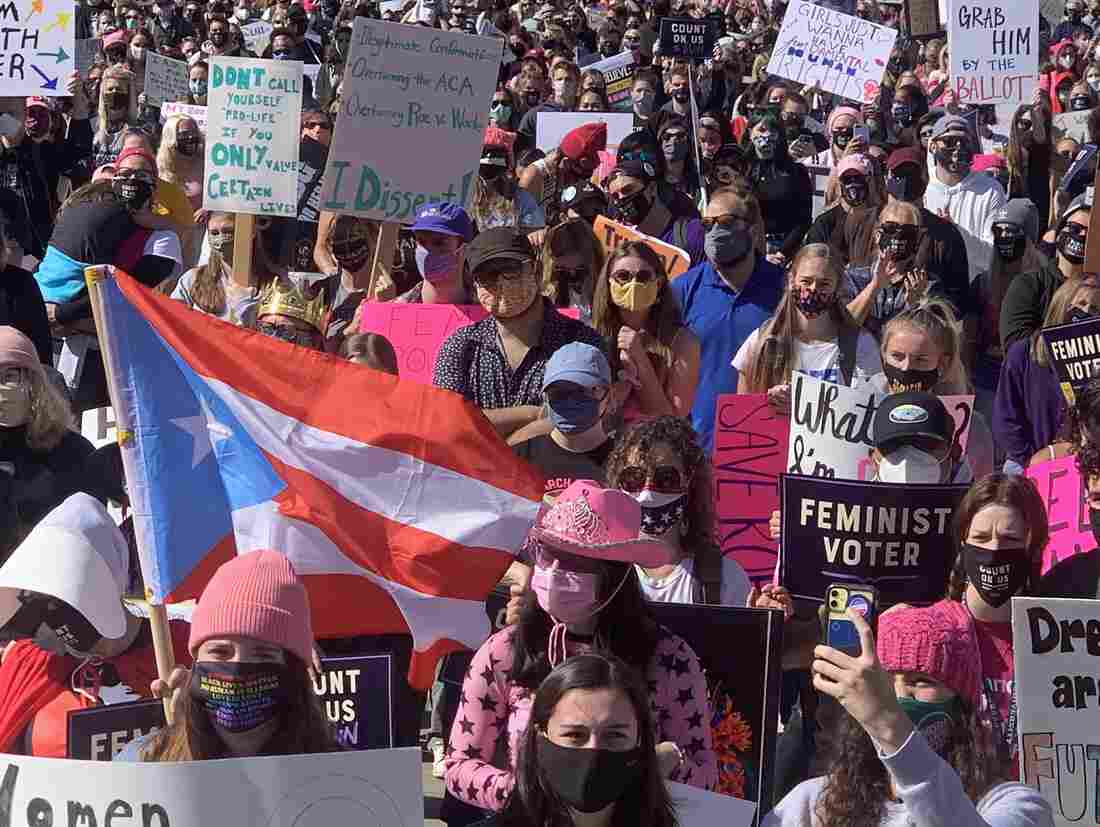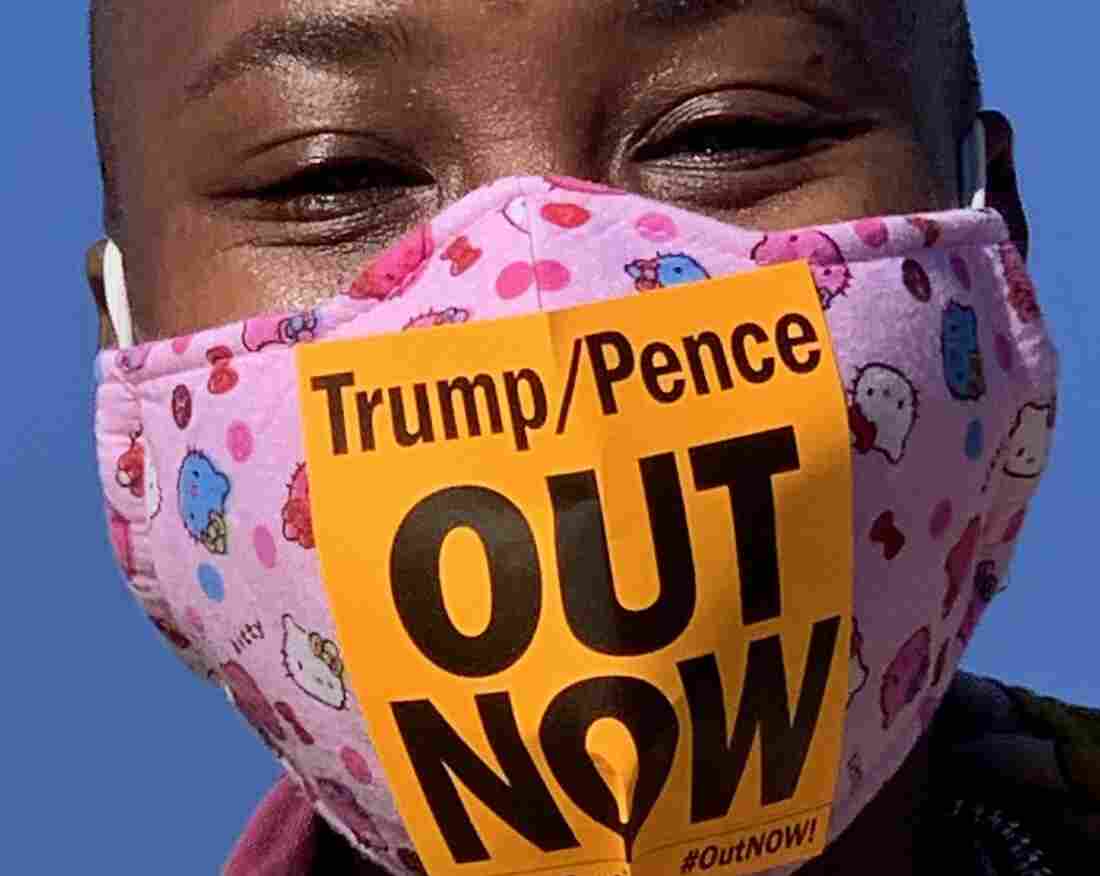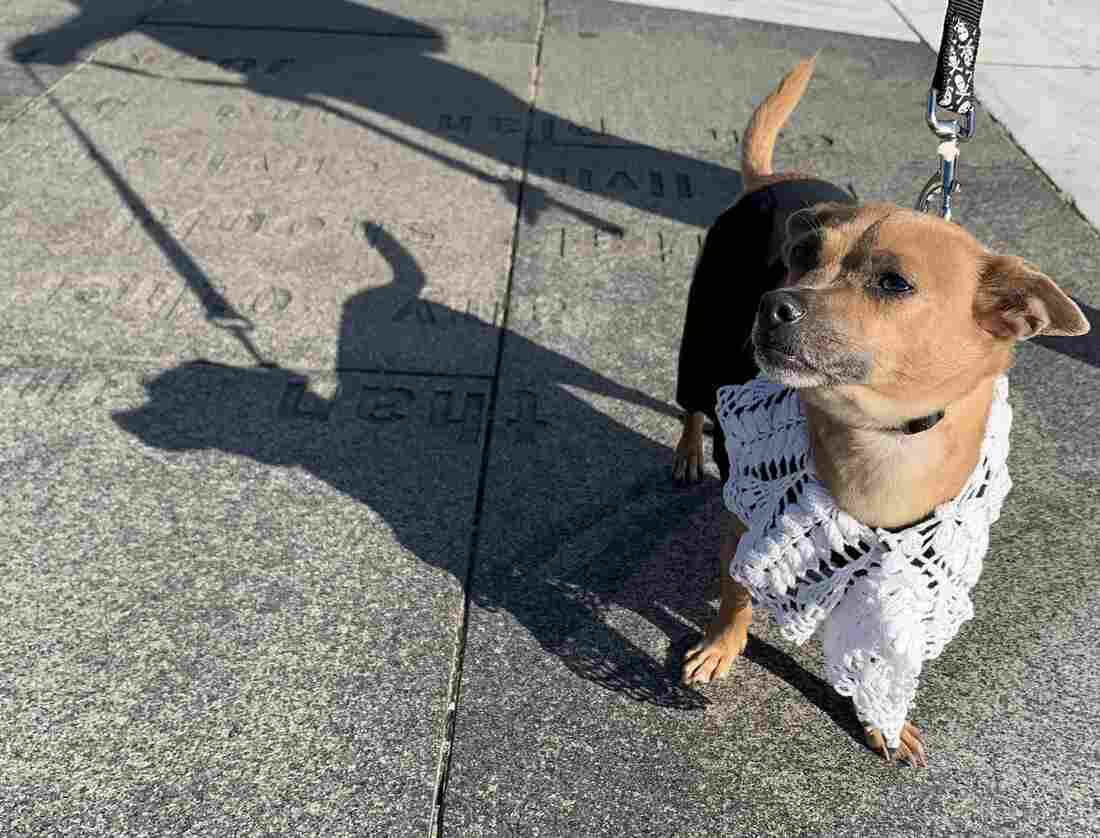
Protesters rally in Washington, D.C., during the latest Women's March, demonstrations that began just after President Trump's inauguration. Carol Guzy for NPR
Updated at 6:08 p.m. ET
Thousands of people gathered Saturday in Washington, D.C., and in hundreds of cities across the country for the fifth Women's March.
The latest iteration of the protest event — first held the day after President Trump's 2017 inauguration — comes 17 days before Election Day and as Republican senators move to quickly confirm the president's third Supreme Court nominee, Judge Amy Coney Barrett.

Jade Tisdol from Boston takes part in the Women's March in Washington, D.C., on Saturday. Carol Guzy for NPR
The controversial election-year nomination was a central focus during this year's events, motivating rallies and marches throughout the day. If confirmed, Barrett would succeed the feminist icon Ruth Bader Ginsburg, a champion of gender equality during her nearly three decades on the court.
Saturday's tent-pole event in Washington was permitted for 10,000 attendees. Organizers said that in total, more than 400 events were planned throughout the country.

Protesters in Washington, D.C., are rallying against President Trump and the nomination of Judge Amy Coney Barrett to the Supreme Court. Carol Guzy for NPR
With Election Day just over two weeks away, mobilizing women to vote was a central theme, alongside other women's rights issues.
In D.C., Sonja Spoo, a reproductive rights activist, said, "Donald Trump is leaving office and there is no choice for him — it is our choice — and we are voting him out come Nov. 3."

Rocky dons a Ginsburg collar for the Women's March in Washington, D.C. Carol Guzy for NPR
One of the largest events planned for Saturday happened in the nation's capital, where nearly four years ago hundreds of thousands gathered a day after Trump was sworn in.
Though smaller than the historic 2017 crowd, women's rights advocates came in droves.
Participants carried signs blasting President Trump and supporting Democratic opponent Joe Biden and running mate Kamala Harris.

Hundreds of people gathered on Boston Common on for the fourth Women's March since Donald Trump took office in 2016. Meredith Nierman/WGBH

Brianna Sink of Sunapee, New Hampshire holds a sign while attending the Boston Women's March. Meredith Nierman/WGBH

A woman wearing leggings featuring former Supreme Court Justice Ruth Bader Ginsburg scales a fence along the Boston Common. Meredith Nierman/WGBH

Mariah Jacobsen (left) of Pemborke, Mass. and Madison Harakles (right) of Longmeadow, Mass. carry signs at the Boston Women's March. Meredith Nierman/WGBH
Many marchers were focused on how Amy Coney Barrett and a more conservative Supreme Court could affect abortion rights.
Allison Barnabe, 26, of Ellicott City, Md., told NPR that she is worried that Roe v. Wade could be overturned and that abortion rights may be eroded.
"The fact that I am living in a country now where I am concerned, and I've never had to be, is a very scary thought," Barnabe said.

Allison Barnabe, at the D.C. rally, said she is worried that Roe v. Wade could be overturned and that abortion rights may be eroded. Sarah McCammon/NPR
Marches also brought crowds past the Supreme Court building. Images of the late Justice Ginsburg appeared throughout the crowd. At least one sign made reference to Ginsburg's request that the nomination process await the results of the election.
At a rally, Fatima Goss Graves of the National Women's Law Center called the late justice the "architect of our foundational rights" in the U.S. She also delivered a litany against Trump nominee Barrett, saying this week's confirmation hearings left her "without a doubt" that Barrett would "undermine our rights."
"She will undermine our access to reproductive health care, to abortion from voting rights to climate change. She refused to even answer basic questions," Goss Graves told the crowd.
The Senate Judiciary Committee plans to vote on Barrett's nomination this week, which if successful, would mean a full floor vote later this month.
Elsewhere, participants in this year's event confronted anti-abortion-rights protesters — chanting "we have the votes" and "Roe v. Wade has got to go" — gathered at the Supreme Court building.
Outside of Washington, protesters around the country carried the same messages.
In New York, marchers took to Wall Street, chanting, "Donald Trump has got to go," ABC News reports.

Demonstrators rally during the Women's March outside the New York Stock Exchange on Saturday in New York City. Mary Altaffer/AP
A march beginning at Philadelphia's Independence Hall moved toward city hall during the afternoon. Protesters took the opportunity to include racial justice and transgender rights alongside abortion rights during the Philadelphia event, WHYY reports.
Heading down Market Street. Just judging by signs, I’d say this march has gotten a lot more intersectional over the last four years. pic.twitter.com/5zpvK6sYTU
— Katie Meyer (@katieemeyer4) October 17, 2020
Hundreds also turned out in Cleveland, according to WKSU. Speaking before an event there, Ruth Gray of Cleveland's chapter of the National Congress of Black Women similarly touched on themes of intersectionality.
"We have to address the issues in this country. The 'isms' in this country. The systemic racism in this country. The systemic oppression in this country," Gray said.
Marchers also gathered in downtown Chicago and other major cities.

Jackie Simmons wears a mask with a message as she attends the Women's March in downtown Chicago on Saturday. Nam Y. Huh/AP
Sister events weren't confined to major cities. In Geneva, Ill., a city some 40 miles west of Chicago, dozens gathered in an intersection, holding signs honoring Ginsburg, Northern Public Radio reports.
"in" - Google News
October 18, 2020 at 12:51AM
https://ift.tt/2HbY2fs
Women's Marches Bring Thousands To Washington, D.C., And Cities Nationwide - NPR
"in" - Google News
https://ift.tt/2MLa3Y1
https://ift.tt/2YrnuUx
Bagikan Berita Ini














0 Response to "Women's Marches Bring Thousands To Washington, D.C., And Cities Nationwide - NPR"
Post a Comment